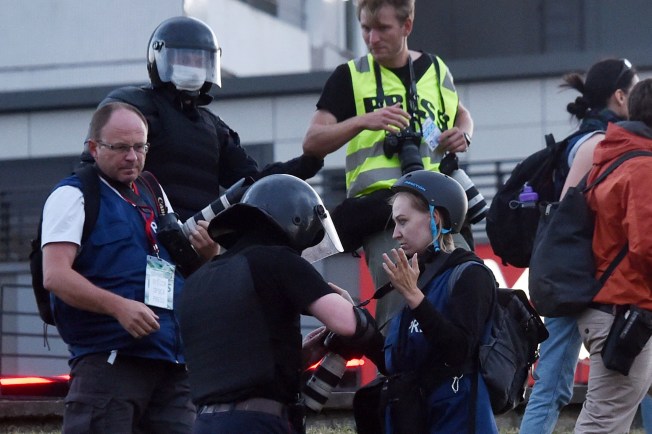New York, May 4, 2021 – The Committee to Protect Journalists today condemned a set of amendments passed by the Belarusian parliament that could severely stifle press freedom in the country.
On April 21, the National Assembly, the upper house of parliament, adopted amendments to the country’s Mass Media Law and to the Law on Mass Gatherings, which had been passed by the lower house on April 16, according to news reports.
The legislation includes a ban on coverage of unsanctioned protests, restrictions on the establishment of media outlets, and other policies to restrict press freedom, according to news reports, the texts of the amendments, and Aleh Aheyeu, a lawyer with the Belarusian Association of Journalists, a local advocacy and trade group, who spoke with CPJ in a phone interview.
To enter into force, the amendments need to be approved by the Constitutional Court and then signed by President Aleksandr Lukashenko, according to those reports. Aheyeu said that the process was very opaque, and that it was unclear whether the bills were with the president or the court as of today.
“Belarusian authorities have been systematically repressing the remaining free voices in the country, and now they want to change the law to further harass independent journalists into silence,” said Gulnoza Said, CPJ’s Europe and Central Asia program coordinator. “The Belarusian government should not adopt restrictive new amendments that would critically endanger journalism in the country, and must once and for all stop persecuting journalists for simply doing their jobs.”
Provisions in the Mass Media Law amendments include:
- Permitting the Ministry of Information to “stop the production” of a media outlet’s work or block access to an internet resource without a court order if the outlet has received at least two written warnings in one year or publishes anything “threatening national security” as decided by the Interdepartmental Commission on Safety in the Informational Sphere
- Permitting the national prosecutor general and regional prosecutors to block access to any websites that disseminate information they believe is “aimed at promoting extremist activity” or which otherwise “is capable of harming the national interest”
- Barring media organizations from “distributing inaccurate information which can bring harm to the state and societal interests,” a provision that a BAJ legal analysis said was written with “imprecision and blurriness”
- Requiring that online media outlets use a website address matching their organization’s name, which Aheyeu told CPJ might be a measure to combat the use of “mirror domains,” in which a website’s content is duplicated across other web domains
- Barring any person or news organization, as a corporate entity, from opening any new outlets within five years of authorities’ closing any of its other affiliated outlets, or three years for online-only outlets and their owners
- Barring news organizations and websites from publishing the results of polls on political, social, or electoral issues if those polls were conducted without state accreditation
The amendments do not specify the penalties for violations; Aheyeu told CPJ that such penalties will be determined as the authorities interpret the amendments and impose penalties based on the criminal and administrative codes.
The Law on Mass Gatherings amendments include a ban on livestreaming or otherwise covering unsanctioned protests in the country, which Aheyeu told CPJ was likely in response to the cases of Belsat journalists Daria Chultsova and Katsiaryna Andreyeva, who were convicted in February over their protest coverage, which authorities alleged constituted “organizing” protests, as CPJ documented at the time.
“They were sentenced on these charges already, and the regulation appears post-facto, in order to ban mass media from showing the mass scale of the protest actions against today’s authorities,” Aheyeu said. That amendment also does not note a specific penalty.
“[If these amendments are enacted] working conditions for the media in Belarus will deteriorate significantly, and it will become more difficult for both Belarusian and foreign media to work in the country,” Aheyeu told CPJ.
CPJ emailed the National Assembly of Belarus and contacted the office of the presidency through its official website for comment, but did not receive any responses.
